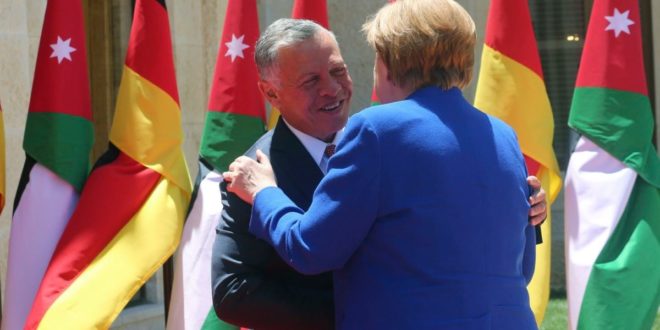By Dr. Shehab Al Makahleh
Amman has turned out to be the magnet for western officials recently with American, Israeli, German and British officials’ visits to Jordan. White House Senior Adviser Jared Kushner, German Chancellor Angela Merkel, and Prince William, Duke of Cambridge, as well as Israeli Prime Minister Benyamin Netanyahu have started visiting Jordan with eyes on the so-called “Deal of the Century” and the amendments to the proposed pact to settle the conflict between Palestinians and Israelis.
The White House issued a statement which showed that US President Donald Trump’s Senior Adviser Kushner, met on Tuesday with Jordan’s King Abdullah II and discussed with him the humanitarian situation in Gaza and the efforts exerted to create peace between Israel and the Palestinians. The meeting, which also included Special Representative for International Negotiations Jason Greenblatt, came one day after a Tête-à-Tête between the King of Jordan and Netanyahu on the best means to advance regional peace and put an end to military operations.
Tuesday’s tweet of Greenblatt about the meeting between Netanyahu and King Abdullah shows that relations have returned back to normalcy between Jordan and Israel, and that time is ripe now for advancing the peace process and bilateral relations. Greenbelt confirmed in his tweet that the Israeli premier “reiterated Israel’s commitment to maintaining the status quo at the holy sites in Jerusalem”, which means that Jordan will keep custodianship over Christian and Muslim holy sites for itself.
On June 20, German Chancellor Angela Merkel will start an official visit to the Kingdom where she is scheduled to hold talks with King Abdullah on bilateral cooperation and partnership as well as regional developments including economic support to Jordan and the peace process.
On June 24, Prince William, Duke of Cambridge, will start his tour in Jordan, Israel and the Palestinian National Authority. On June 25, the king of Jordan will be having meetings with American President Donald Trump about the Century Deal, poised military action in Southern Syria, the economic hardships that Jordan is undergoing as well as other issues of concern to both countries.
In Jordan, the Duke he is slated to meet with crown prince Hussein bin Abdullah as well as senior Jordanian officials before he goes to Northern Jordan to check on the situation of the Syrian refugees and will visit Jerash.
All of these activities in Jordan, mainly the visit of the Israeli prime minister who was accompanied by Mossad Director Yossi Cohen, and senior National Security Council officials and ministers, reflect that Jordan is back on track in the Middle East overlapping files. The visit of Netanyahu and his delegation was not only political but rather economic and security-related.
King Abdullah’s meeting with Netanyahu, the first public meeting since 2014, is deemed significant for both nations and for the whole region. An indication has come on scene that Tel Aviv tries to build new bridges with Amman after mutual confidence has collapsed recently, with some Jordanian blames on the Israeli government for playing behind Jordan’s back.
Amman has stressed that no peace would be reached without a just and comprehensive settlement in the region that enables the Palestinians to achieve their “legitimate aspirations to establish an independent Palestinian state along the lines of June 4, 1967 with East Jerusalem as its capital”. This cannot be achieved without ending the impasse in the peace process and without relaunching serious and effective negotiations between the Palestinians and the Israelis on the basis of the two-state solution, the Arab peace initiative and the resolutions of international legitimacy.
What did Netanyahu and Kushner hear from the King?
Both Netanyahu and Kushner heard one statement as confidential sources said: The issue of Jerusalem should not be stated in any deal until the final settlement, leaving this complicated file till final status issues are addressed not only with the Palestinians but with the Arabs as well.
The question of Jerusalem must be settled within final status issues, as the key to achieving peace in the region. The meeting has concluded with a checkmate as Netanyahu lost in the rift with Jordan. The Israeli premier has given up and paid the visit at the highest ever level by an Israeli premier to Jordan.
When Israelis affirm that Jordan will continue to play its historic role in protecting the Islamic and Christian holy sites in the city of Jerusalem, this will facilitate reaching a solution to the Palestinian-Israeli issue. Sources which attended the Jordanian- Israeli meeting said that Netanyahu has “committed to stop all measures that undermine or obstruct the Jordanian guardianship, including the work permits for Jordanian security personnel, the operation of surveillance cameras through a Jordanian Waqf committee and the transfer of salaries and funds to serve the mosque”.
Both Netanyahu and Kushner have found that King Abdullah II today is not the king of yesterday as now he is highly supported by the people who stood against all ordeals and predicaments. This has given the king of Jordan an upper hand and such visits are a confirmation that he has a major role to play at the Middle East region.
The recent demonstrations in Jordan have given the king a momentum to maneuver and to exercise pressure on regional and international world powers not only vis-à-vis the Jordanian internal economic hardships but rather regarding major regional conflicts.
The visit of Netanyahu, Kushner and Greenbelt comes at a time the Syrian army is mobilising more than 40,000 of its troops to launch a military attack on Dera’a, Suwaida and Qunaitra unless a deal is reached at the last moment between the Russians and the fighters in the three provinces, which are neighboring Jordan, Lebanon and Israel.
Such visits cannot be viewed separately; they are interrelated and aim to alleviate Jordan’s concerns over the Holy Sites in Jerusalem in terms of custodianship and to calm both Jordan and Israel from any military strikes near their borders by the Syrian army, which would cause further influx of refugees to Jordan.
 Geostrategic Media Political Commentary, Analysis, Security, Defense
Geostrategic Media Political Commentary, Analysis, Security, Defense





